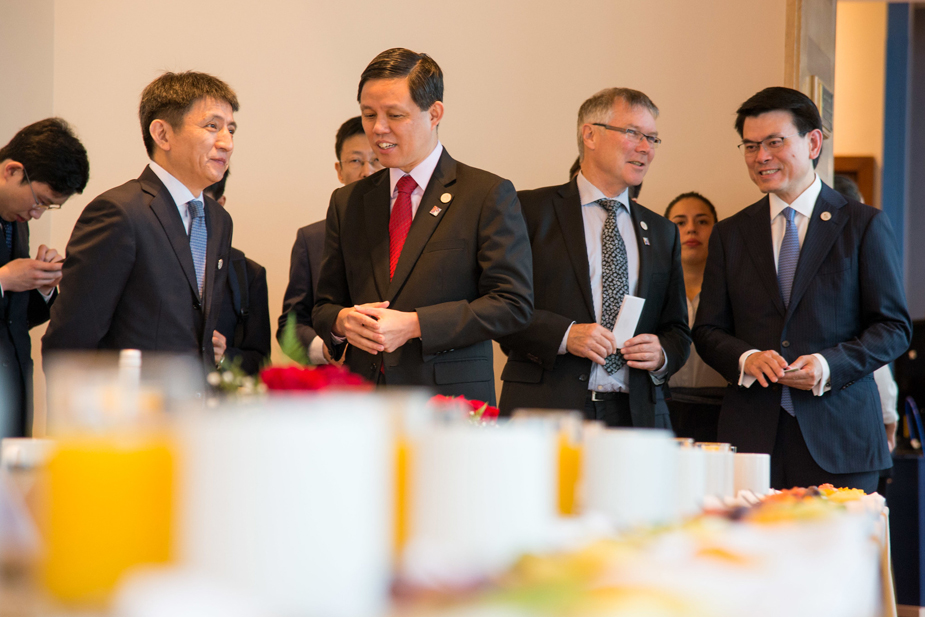Last page update:
 China's Assistant Minister of Commerce Li Chenggang; Singapore’s Trade Minister Chan Chun Sing; New Zealand’s Minister for Foreign Affairs and Trade David Parker; Hong Kong, China’s Secretary for Commerce and Economic Development Edward Yau Tang-Wah.
China's Assistant Minister of Commerce Li Chenggang; Singapore’s Trade Minister Chan Chun Sing; New Zealand’s Minister for Foreign Affairs and Trade David Parker; Hong Kong, China’s Secretary for Commerce and Economic Development Edward Yau Tang-Wah.
By Dr Rebecca Fatima Sta Maria
Just when we thought trade talks between the United States and China were nearing the finish line earlier this month, a specter of higher tariffs surfaced giving rise to the fear that tensions will escalate before they are resolved.
Yet trade negotiations are not bad news in and of themselves. Quite the opposite.
The global trading system benefits when economies are engaged and talking about mutually beneficial solutions. When they stop talking, that’s when you can start to worry.
Trade ministers from across the Pacific Rim economies convened in Chile last Friday and Saturday for an annual Asia-Pacific Economic Cooperation (APEC) meeting—one of many that will be held this year in South America’s most stable economy, the host of APEC 2019.
Over the weekend, trade ministers exchanged views on how the APEC forum can bolster the rules-based multilateral trading system and work in support of the World Trade Organization. With trade declining as the region’s driver of growth, the ministers also strategized how to strengthen trade while weighing other potential growth engines.
In our deliberations, trade ministers agreed that stronger trade is a way towards greater shared prosperity – the ultimate goal for APEC. That means a broader focus for the forum, one that promotes more equitable distribution of economic gains, more environmental sustainability, and an inclusive adaptation of digital technology – one that does not leave anyone behind, including small businesses and women-led enterprises.
APEC differs from the negotiating table, as well as from other trading blocs, in that it aims to promote voluntary and solutions-oriented collaboration among members who otherwise may not have opportunity to engage each other. Instead of setting and enforcing rules, APEC is at the forefront of coming up with good ideas.
After a briefing by the WTO Director General, for example, trade ministers were given a demonstration of an app, FundShe courtesy of Tingqiao Zhou and Hailong Han, the winners of a challenge aimed at young app developers — of how digital technology can open up markets for small businesses and less-represented members of society.
More often than not, these communities on the margins comprise women. Chile has made women’s economic empowerment a priority issue because they recognize that the equal economic participation of all can raise the global GDP by trillions of dollars. This focus on more inclusive growth is the product of years of deliberation between APEC officials, policy experts, and the business community. This formula of open dialogue and multi-sectoral consultation has made the forum indispensable during trying times and big change.
Today, that change is a more tepid outlook for growth. The APEC Policy Support Unit projects regional growth of 3.8 per cent for 2019. But that’s still a drop from 4.1 per cent in 2018.
A report they released recently notes uncertainties brought about by trade tensions and barriers, tariff hikes, and counter measures. If this protectionism is unchecked, supply chains will be impacted and prices will increase. That is when the real economy – and all of us – starts to suffer.
More economic cooperation rather than less will see the region through difficult times. The prosperity of one economy depends on the prosperity of its neighbors.
A meeting of key policymakers at this time is much needed assurance that multilateral economic cooperation in the region perseveres and ventures forward as we share each other’s joy and pain. With tougher times ahead, we will need each other’s help more than ever.
The article was published by El Mercurio on 22 May 2019.

